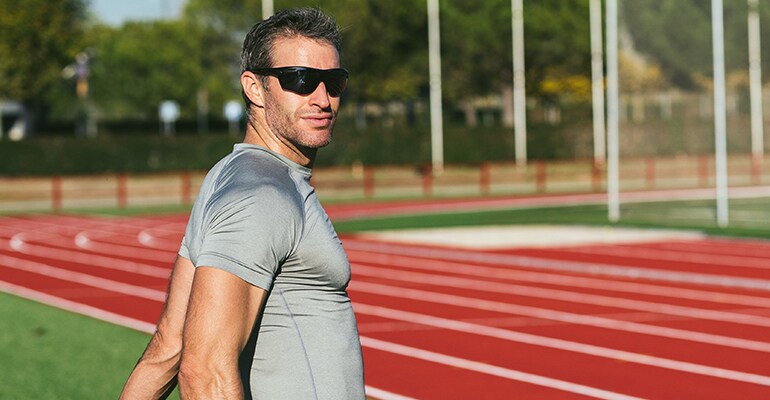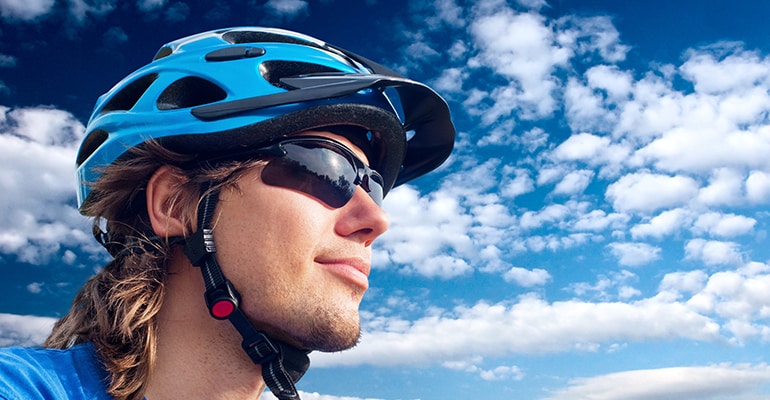how to choose a good pair of sport glasses
Aug 08, 2023
Sport glasses, also known as sports eyewear or athletic goggles, are specialized eyeglasses designed to enhance visual performance and protect the eyes during sports and other physical activities. Whether you're an amateur athlete or a professional competitor, sport glasses offer numerous benefits that can significantly improve your performance and safeguard your eyes from potential injuries. With advanced technologies and specialized features, these glasses have become an essential gear for athletes across various disciplines.
What is sport glasses?
Sport glasses, also known as sports goggles or athletic eyewear, are specialized eyeglasses designed to protect the eyes during various sporting activities. They are specifically designed to be more durable and impact-resistant than regular eyeglasses or sunglasses.

Who need sport glasses?
Sport glasses are designed to provide protection and enhance performance for individuals participating in various sports and physical activities. They are beneficial for the following groups of people:
Athletes: Sports glasses are commonly used by athletes involved in outdoor sports such as cycling, running, skiing, snowboarding, basketball, soccer, tennis, and many others. These glasses can protect their eyes from potential injuries caused by flying objects, impact, or harsh weather conditions.
Individuals with Vision Problems: People who have vision problems such as nearsightedness, farsightedness, or astigmatism may require prescription sport glasses to improve their visual acuity while engaging in sports. These glasses can be customized to match their specific prescription needs.
Outdoor Enthusiasts: Hikers, mountaineers, climbers, and other outdoor enthusiasts often wear sport glasses to shield their eyes from wind, dust, debris, and harmful UV rays. Additionally, polarized lenses can reduce glare from surfaces like water, snow, or ice, providing better visibility and reducing eye strain.
Children and Teens: Kids and teenagers involved in sports activities should wear protective sport glasses to minimize the risk of eye injuries. Many eye injuries occur during sports, and wearing appropriate eyewear can greatly reduce the chances of severe damage.
Individuals with Light Sensitivity: Some people are more sensitive to bright light or suffer from conditions like photophobia or migraine. For them, sport glasses with tinted or photochromic lenses that adjust to different light conditions can offer relief and enable them to engage in outdoor activities comfortably.

How to choose a pair of good sport glasses?
Choosing good sports glasses involves considering various factors. Here's a step-by-step guide to help you make an informed decision:
Assess Your Needs: Determine the specific requirements for your sport or activity. Consider factors such as lighting conditions, potential hazards, and the level of impact involved in the sport.
Lens Technology: Select lenses with features that cater to your needs. For outdoor activities, opt for lenses with UV protection, polarization to reduce glare, and photochromic capabilities to adjust to changing light conditions. Indoor sports may require clear lenses with anti-glare coatings.
Impact Resistance: Look for sports glasses with lenses made of impact-resistant materials like polycarbonate. Check if the glasses meet relevant safety standards, such as ASTM F803 for high-impact sports.
Fit and Comfort: Ensure the sports glasses fit securely and comfortably on your face. Adjustable nose pads and temple tips can provide a customized fit. Try on different models to find the one that feels comfortable and doesn't slide or pinch.
Frame Durability: Consider frames made from durable materials like nylon or TR-90, which are lightweight and flexible while offering sufficient strength and resistance to bending or breaking.
Coverage and Peripheral Vision: The glasses should provide adequate coverage to protect your eyes from debris, wind, and other elements specific to your sport. However, ensure that they don't obstruct your peripheral vision, as it's crucial for awareness and performance.
Prescription Compatibility: If you require prescription lenses, check if the sports glasses offer options for prescription inserts or direct prescription lenses. Consult with an optician to ensure your prescription needs are met.
Anti-Fogging: For activities that generate sweat or involve varying temperatures, consider sports glasses with anti-fog coatings or proper ventilation systems to prevent fogging and maintain clear vision.
Reviews and Recommendations: Read customer reviews and seek recommendations from athletes or professionals in your sport. Their experiences and insights can help you find reputable brands or specific models that are well-regarded for sports use.
Budget Considerations: Set a budget range based on your needs and quality expectations. While it's important to invest in good-quality sports glasses, there are options available at various price points to suit different budgets.

By considering these factors and personalizing the selection process to match your specific sporting needs, you can choose sports glasses that offer optimal performance, protection, and comfort.